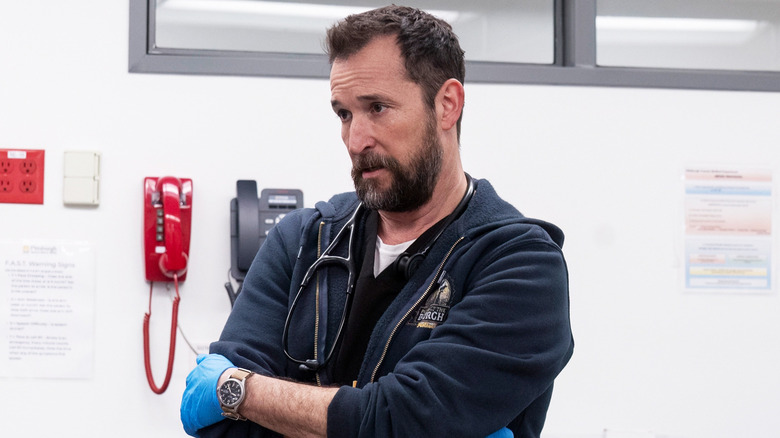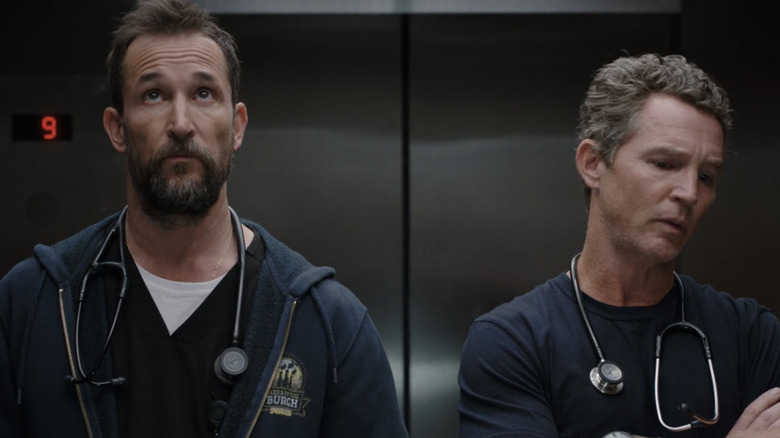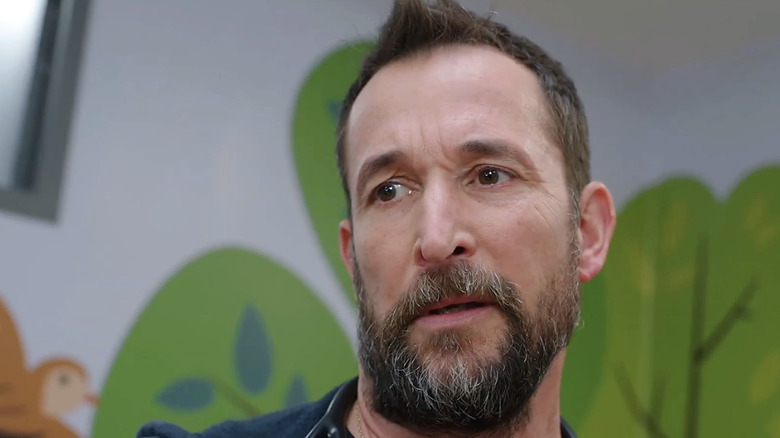The Pitt Has A Real World Impact On Americans' Perception Of Medical Industry Issues
Nobody could watch "The Pitt" and not be affected by the series' searing drama and realistic portrayal of emergency medical professionals. But it seems the HBO Max series actually has a measurable real-world effect not only on people's understanding of the issues plaguing the medical industry but on their likelihood to take action regarding their own healthcare. According to a study, viewers of the popular medical drama sought out information about organ donation and end-of-life care, as well as coming away with a much more informed view of the medical industry, which was likely to change how they interact with and approach real life staff.
One of the big selling points of "The Pitt" is its medical accuracy. The show grew out of creator R. Scott Gemmill, producer John Wells, and producer/star Noah Wyle's desire to showcase how medical professionals had been affected by the global pandemic and explore their lingering trauma in order to tell a story with significant real-world parallels. When coupled with the outstanding performances (Wyle won his first Emmy for his portrayal of Dr. Michael Robinavitch), meticulous production design, and handheld shooting style, "The Pitt" was almost a little too realistic, leaving viewers nothing short of bereft when the 15th and final episode of season 1 was finished.
However, while those viewers might have been sad to say goodbye to a cast that felt very much like real-life people, they at least came away with an appreciation for the often harrowing conditions under which the actor's real-life counterparts are working.
The Pitt made people more likely to take healthcare action
"The Pitt" writers had one rule that guided the series, which essentially came down to ensuring things were as accurate as possible. That seems to have had some genuine real-world effects. As Deadline reports, USC's research center, the Norman Lear Center, conducted a study which found that viewers not only came away from the series with a greater understanding of real-life medical practice but were actually moved to take real-world action when it came to specific health issues.
The study, part of the center's Hollywood, Health & Society program, involved interviewing 25 medical professionals and surveying 1,409 HBO Max viewers, with 709 of those viewers having watched at least three episodes of "The Pitt" (which will return for season 2 in January 2026). The researchers looked at two specific storylines, one involving organ donation and the other involving end-of-life decisions. Results showed that more than one in four viewers of the organ donation storyline sought out further information on the topic, while more than a third of the end-of-life storyline viewers did the same for that topic. What's more, 90% of viewers agreed that "The Pitt" both entertains and educates viewers about the issues it showcases, including making "provider stress" more relatable and demonstrating how understaffing affects patients.
In more specific terms, the study revealed that 26.9% of those who watched the organ donation storyline actually intended to register or discuss organ donation after watching the show. 41.1% of viewers who saw that storyline also sought blood donation information, and 22.8% shared blood donation information. Meanwhile, 38.8% of audience members who saw the end-of-life storyline sought further information about similar care and were found to be more likely to say they would make end-of-life plans than those who hadn't watched.
Medical staff felt 'seen' by The Pitt
The Norman Lear Center's Hollywood, Health & Society program actually provided the expert consultants used by "The Pitt" to ensure it was medically accurate. But they also contributed to the show's demonstrations of issues faced by medical staff. Interviews with medical professionals conducted as part of the study revealed that participants felt "seen" by "The Pitt" and saw the show as uniquely authentic. In particular, they praised the show's portrayal of systemic healthcare issues such as overcrowding and underfunding, as well as the "hidden toll" on medical staff. That's not all that surprising, given how "The Pitt" never loses sight of its goal to inform while also entertaining.
The series showcases the mental hardships endured by medical staff right from the off, when Noah Wyle's Dr. Robby finds Shawn Hatosy's Dr. Jack Abbot on the roof of the fictional Pittsburgh Trauma Medical Center. Having made it through a particularly tough shift, Abbott is reflecting on why he became a doctor in the first place, and at times he appears to be considering leaping from the roof.
As the first season develops, we're shown multiple other specific examples of how hospital staff take an emotional, and sometimes physical battering. From Dr. Robby informing a family their son is braindead to Katherine LaNasa's head nurse Dana Evans taking a punch from an irate patient, the entire show seems designed to demonstrate just how brutal emergency medicine can be for staff. That's to say nothing of Dr. Robby's eventual breakdown, which is prompted by the day from hell, one that feels upsettingly realistic, thanks to one of the best TV performances of 2025. As such, you'd arguably be surprised to find that viewers didn't come away with a better understanding of how tough ER work is.


